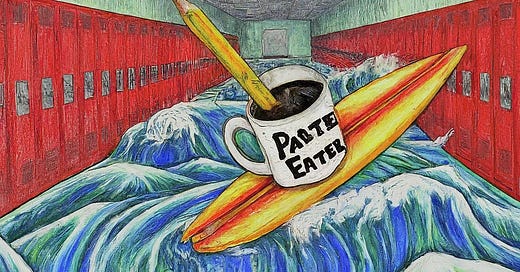Three minutes to summer.
Students swirl by the doors as teacher-levees hold them back. Anxious excitement sizzles the air. Lockers stand agape, their contents transforming trash cans to mountain islands. Conversations and laughter crash against each other, growing louder and louder, merging into a single dull noise. It crescendos with each passing second, rising and falling and climbing ever higher.
The roar.
This dissonant cacophony swells and soars, escalates and expands, towers and intensifies. Drop your decibel reader—the numbers lie. It’s louder. The roar crosses to synesthesia. You feel the noise like the wind and the waves. It’s physical and tangible, yet volatile, urgent, and unstable.
This feeling is like New Years’ Eve and more. Like New Years, crowds sway, waiting for the moment when pent up energy crackles through the air. Shreds of paper polka dot the floor like confetti. Trampled pens leave plastic shards in the carpet. Yet there’s more. Excitement swells like blind floodwaters at a dam or boiling mercury at thermometer’s edge. The energy waits like children at Christmas or surprise parties seconds before the surprise.
Two minutes to summer. Stop and consider.
The roar started weeks ago as a murmur. Nothing changed above the surface, but you never see the tide rise with the first wave. After Spring Break the halls became louder, more frantic, more frenzied. Mischief started rolling together. Students ran but still arrived late. Order strained.
Time started flowing differently. Mid-March felt closer to summer than mid-May. Like inverse lines, as students grew energetic, adults grew more tired. Everyday brought Friday-like exhaustion. Coffee lost its punch. If April was long, May was endless. Time rained and rained.
Yearly rituals marked the time and rising waters—tournaments, awards, and sunscreen on shelves. Field trips meant missed days and tests became final. Summer became days, not weeks. Lockers were cleaned and long lost pencils were found. But despite attempts to hasten the clock, nothing. Until the last day came like a rogue wave.
One minute to summer.
In those final seconds, the waters of excitement build and build. Nobody remains still. Backpacks swing to shoulders as the last yearbooks are signed. Girls hug and boys guffaw. All shout over last second announcements. Levees strain and stretch. The roar grows, pulsing and crashing, shaking your bones and sinews. It’s metaphysical. It moves in and out like a breath until you merge with it. All focus on the same thought.
Then it comes. The final bell. Summer.
The dam bursts. A student wave roars and floods and courses through the halls with furious resolve. Many cheer and raise their hands, surfing to freedom. This moment stretches to minutes. Conversations eddy, swirl, and fade out. “Have a great summer!” “Thanks for a great year.” “Make good decisions.” Hallways continue draining until the last students meander. Now a small stream trickles until nothing. Only adults remain.
Then another roar. The silence. The vacuum.
The flood recedes and the aftermath remains. Teacher-levees stand, dazed. The wave recedes, leaving halls empty except for flotsam—snack wrappers and leftover locker scraps. Soft conversations start, but never quite end. Several minutes pass, then teachers and custodians alike turn around to clean and declutter.
Later a custodian flips the hallway lights. This was the curtain. Teachers say their goodbyes. Seasons end for some while the series ends for others. The cast changes. All are older. Roll the dice and predict the rest, but for now, "rest" reigns. Finally.
The halls are darkened, silent, and dormant. Another year has ended.
Post Script: For years now I’ve journaled about the last days of school for teachers. This will likely be the first in a short series about the liminal space between one school year and another—that wellspring called summer.
Recommendations. If you enjoyed this post, check out some of my others:
Teachers Are Like Markers. This April roundup summarizes my posts since February.
Ten Things in my Desk (Folgers, Sponsor Me!) This post describes ten things in my desk… and begs for Folgers generous corporate sponsorship.
Fast Food Workers of the Mind. Public schools push standards for quality control, but in the end tests limit learning and render everyone interchangeable.
Schools Should Teach Letter Writing. This two-parter argues schools should teach more than academic writing. Our mental models for writing differ whether you started with letters… or text messages.
Stop Grading Essays with Amnesia. Many teachers burn out and waste time giving student feedback. Check out other perspectives and time saving tips!
.






Love it!